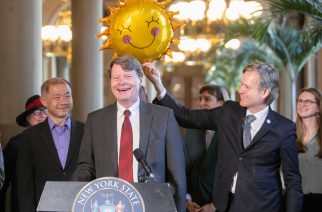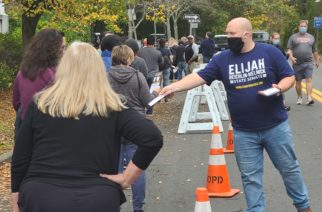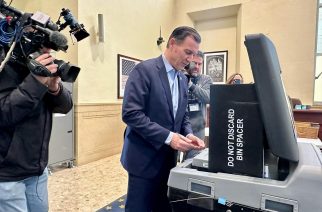
Senate Majority Leader Mitch McConnell announced a $500 billion COVID-19 relief package on Sept. 8 which was blocked 52-47 on Sept. 10. Soon after the GOP bill failed, Sen. McConnell shifted his focus on the Supreme Court nomination following the passing of former U.S. Supreme Court Justice, Ruth Bader Ginsburg who died on Sept. 18.
This decision, along with the failed COVID-19 package, has deepened the fissure between the Democratic and Republican Senators.
Sen. McConnell’s push to move forward with the Supreme Court nomination came with controversy as the presidential election is just over a month away. Democrats argued that this decision was hypocritical on part of McConnell and other members of the GOP due to McConnell’s blocking of former President Barack Obama’s nomination for Merrick Garland in 2016.
Claims of hypocrisy are being tossed around on both sides. In 2016, the U.S. Senate Democrats released the campaign video, #DoYourJob calling Senate Republicans to action for passing Obama’s nominee during an election year. Now, Senate Minority Charles Schumer and U.S. Representative Alexandria Ocasio-Cortez stress the importance of waiting until the results of the election before choosing a replacement for Ginsburg.
“It is extraordinarily important that we understand the stakes of this vacancy,” Ocasio-Cortez said. “With an early appointment all of our rights, the rights that so many people died for: voting rights, reproductive rights, healthcare rights. All of those rights are at risk with this appointment and so we need to make sure that we mobilize on an unprecedented scale to ensure that this vacancy is reserved for the next president.”
Currently, Senate Democrats have collectively shown their opposition to filling a Supreme Court vacancy, a lifetime position, during an election year. Republican Senators hold a slim majority, with 53 members of the GOP. However, two of these members have since vowed to not vote on a Supreme Court nominee until after the election.
“We only need two more senators to say that they will abide by RBG’s wish. Two have already said it, we need two more,” Sen. Schumer said. “So, Americans, if you care about all these rights, if you don’t want big, powerful, wealthy special interests to turn the clock back 100 years even, please our fervent plea, our fervent wish is that you call your senator and say abide by the wishes of this saintly, brilliant, caring woman.”
In a press release on Sept. 22 Sen. McConnell emphasized that himself and other members of the GOP were acting on precedent. McConnell argued that the current situation is different than the case of Obama’s nominee in 2016 because the White House and Senate were dominated by different parties.
“I’ll tell you what really could threaten our system of government,” Sen. McConnell said. “It is not Senate Republicans doing legitimate things, squarely within the Senate rules and within the Constitution, that Democrats happen to dislike.”
Similar tensions were reflected in the bipartisan split to pass a COVID-19 package earlier this month. The bill needed 60 votes in order to pass. There was almost unanimous support from the 53 Senate Republicans but no support from the Senate Democrats, making it unlikely for another relief package to move forward before the election in November.
“This bill is not going to happen because it is so emaciated, so filled with poison pills, so partisanly designed,” Senate Minority Leader Chuck Schumer said leading up to the vote on the stimulus bill. “It was designed to fail.”
Sen. McConnell addressed the reduced budget and its clear unpopularity with the Senate Democrats.
“Senators will not be voting on whether this package satisfies every one of their legislative hopes and dreams. That is not what we do in this chamber,” he said. “We vote on whether to make laws. Whether to forge a compromise; do a lot of good for the country, and keep arguing over our remaining differences later.”
The stalemate between Senate Republicans and Democrats continues, as does the threat of COVID-19. The Centers for Disease Control and Prevention (CDC) attributed almost 200,000 deaths in the U.S. to COVID-19 with over 6.8 million total cases.
According to The Associated Press, the failed bill would have allocated $105 billion to K-12 schools for reopening, $15 billion to aid in reopening child care providers, $16 billion for COVID-19 testing and $31 billion for development of a vaccine.
An aspect of the bill that may have appealed to the Senate Republicans was the extension of the Paycheck Protection Program (PPP), as well as legal protection for businesses.
The PPP provided funds in the form of forgivable loans for small businesses that prioritized keeping workers on payroll, but the loan could also be applied to utilities, mortgages and rent. The program ended Aug. 8 and since the bill was not passed, it will not be extended.
Had it been approved, the federal weekly unemployment payments would have been reinstated and reduced to $300 a week, as compared to the $600 weekly payments that expired at the end of July.
Unlike the CARES Act, Sen. McConnell’s proposed COVID-19 package did not include a second stimulus check. Sen. Schumer addressed the GOP COVID-19 proposal in comparison to the previous CARES Act and said that the CARES Act was responsible for keeping 12 million Americans out of poverty.
“The United States is 11.5 million jobs short — 11.5 million — of where we were at the start of February, and the number of jobs that have been permanently lost is rising at an alarming rate,” Sen. Schumer said.
In addition to cutting payments directly from individuals, the bill did not allocate funding for state and local governments. Gov. Andrew Cuomo discussed such cuts in his briefing on Sept. 9: “Remember what state and local aid goes to: it goes to all the essential workers who we’ve relied on and we continue to rely on.”
Gov. Cuomo addressed the politicalization of the hardships many Americans face during this national crisis in saying that this is not a Republican or Democratic issue, it is an American issue.
“Step up to the plate. Do the right thing the way New Yorkers did the right thing,” Gov. Cuomo said. “New Yorkers showed that they were tough and smart and united and disciplined and loving. We need a little bit of that in Washington, D.C.”
Relief for Americans who are most vulnerable to the impact of COVID-19 remains uncertain. Also uncertain is whether or not the Supreme Court vacancy will be filled prior to the election in November. Donald Trump claims that his nomination will be announced late this week once the services for Ginsburg have ended.









